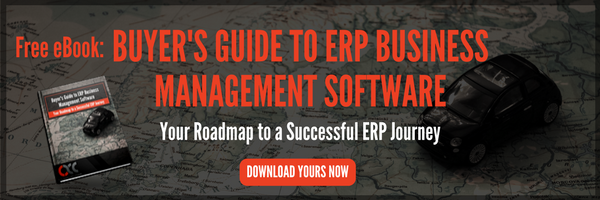Organizational change management and planning will be a major factor in the success of implementation projects. Keeping all levels of the organization engaged in the project is a great start, but as changes to day-to-day operations start rolling out having a concrete plan in place will help to speed user adoption, and avoid the spread of misinformation and chaos. Successful change management strategies keep the company’s mission in mind and make it clear to employees how these changes will help the company to meet their goals in order to create a common vision for change. There must be a plan in place to educate employees the specifics of how their day-to-day work will change and rewards that encourage individuals to take ownership of their new roles and responsibilities.
ERP implementations bring about a lot of changes that will substantially affect employees. Success depends upon how effectively you understand and manage the impacts of these changes. To achieve the best results, proactively prepare employees and the organization as a whole prior to the new systems go-live. A good grasp of potential change impacts will guide your communications, training, and leadership alignment activities while minimizing wasted time and effort.
7 Change Management Considerations for ERP Projects
- Complete an initial assessment and designate a future state. The first step in managing change is to know where you are and where you want to go. Complete a full assessment of your organization’s current state and map all business processes. Then document where you’d like your organization to be, and optimize processes. Only after comparing the two will you be able to make a business case to executives, managers, and end-users and determine which system will get you from point A to point B as smoothly as possible.
- Identify key changes to systems, processes, and organizational structure. Work with department representatives to fully understand potential change impacts of implementing the new system from multiple perspectives and for each role and/or area of an organization. Gathering input on the magnitude of business process impacts will help focus communication and training efforts.
- Understand and communicate how roles and responsibilities will change. Incorporate these changes in role impact guides, job descriptions and training materials. By providing these resources before implementation, you can ensure users understand how expectations will be affected. People are also much more likely to buy-into the project if you can answer the “what’s in it for me” question.
- Secure Organizational Buy-In. In order for your ERP implementation to be successful, there needs to be complete buy-in from all impacted parties, including decision-makers, managers, and end-users. Including end-users in the decision-making process and making a clear business case to them, as well as managers, will encourage social validation for the project and fast-track adoption efforts.
- Develop a training strategy that addresses user’s transition to the new system and processes. The Training Plan should focus on helping users be more productive using the system and include the who, what, when, and why questions needed for pre and post-implementation training. Throughout the training process, communication will be key to a successful adoption across all departments. To ensure that employees are adapting well and are finding success in their newly adjusted positions, be as open and honest as possible with them.
- Create a culture that embraces disruptive change. By leveraging disruption and change acceptance as part of your internal culture, your business will set itself up to be a leader of tomorrow rather than an innovation denier. Disruption is an inevitability that your business can better prepare for by building a culture that routinely embraces change because it is a long-term state of being.
- Assess successes and failures while holding everyone (including yourself) accountable. A few months after the new system goes-live, revisit the future-state documentation, business case, and expected benefits laid out in the early stages of the project. Monitor process and technology adoption and impact on performance compared to baseline performance measures. Consider the satisfaction of key stakeholders looking for specific comments that can guide future direction. And of course, review costs versus benefits and compare to the expected ROI. The benefits from these systems may initially be hard to quantify but a few areas to look at are process improvements, customer experience, compliance, production, planning and control, procurement, reduced shortages and interruptions, better labor allocation, resource commitment and supervisory oversight and more.
As you can see, organizational change management during ERP implementations deals with both people and processes. By adhering to the considerations outlined above, your business will be better equipped to create lasting organization-wide change by maximizing the value and positive impact of the new system and improved processes.
This post is an excerpt from our new ERP Buyer’s Guide. Download it now and discover the Roadmap to a Successful ERP Journey!
